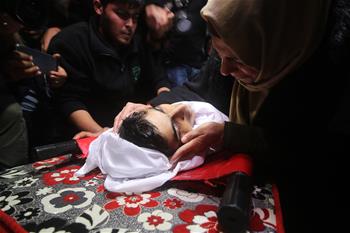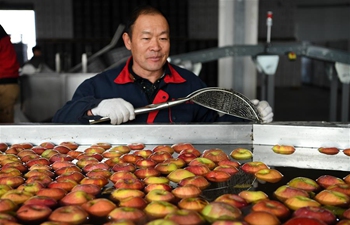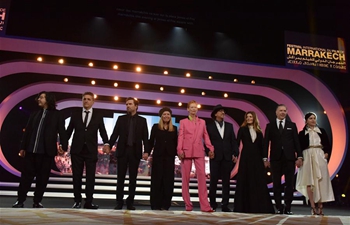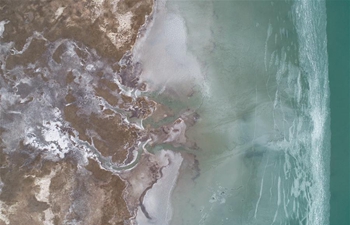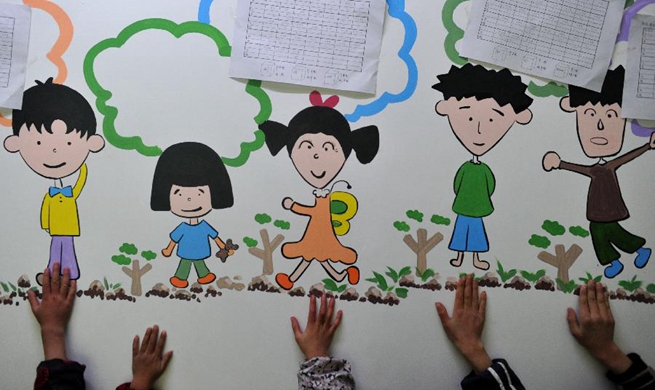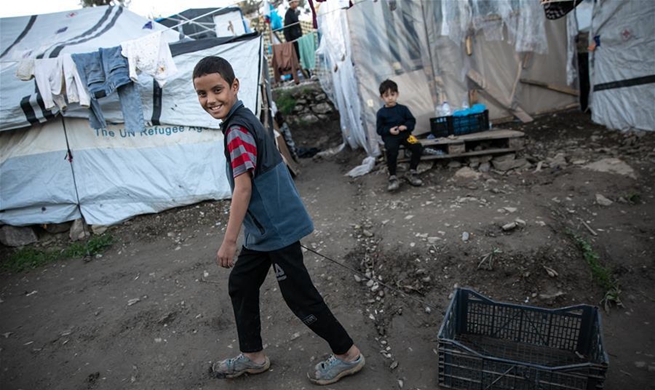THE HAGUE, Nov. 29 (Xinhua) -- The 24th session of the Conference of the States Parties to the Chemical Weapons Convention ended here on Friday with a dispute between the United States and Russia, followed by the adoption of a report by consensus.
The session started peacefully as participants observed the annual Day of Remembrance for all Victims of Chemical Warfare at the headquarters of the Organization for the Prohibition of Chemical Weapons (OPCW). First a commemorative session was held in the Ieper Room, named after the site of the first large-scale chemical weapons attack in April 1915 in Ieper, Belgium.
"On this day, we gather to respect the memory of victims and honor the courage of survivors," said OPCW Director-General Fernando Arias, adding "This day is dedicated to their memory so that the tragic legacy of human suffering left by chemical weapons is never forgotten."
When a violin player played matching music, the attendees, representatives of states parties to the OPCW, victims' associations and others, went outside, laid wreaths and observed a minute of silence at the memorial site. The remembrance reaffirmed the OPCW members' commitment to completely exclude the possibility of the use of chemical weapons.
It looked like an appropriate ending to a successful week, in which the event participants agreed to update their list of banned chemicals for the first time. However, back inside the conference center, the states parties showed that unity among all the delegates is still far off.
The main bone of contention was the alleged use of chemical weapons -- which an OPCW fact-finding mission had concluded -- by the Syrian government in Douma, Syria, on April 7, 2018. Following the attack, the United States, Britain and France responded with missile attacks on targets in Syria, which they claimed were involved in producing chemical weapons.
President Bashar al-Assad of Syria and his ally Russia have always denied that a chemical attack had occurred, saying it was probably staged. Last weekend, news outlet WikiLeaks published an alleged email message from a member of the fact-finding team that investigated the attack, which stated that the OPCW report "misrepresented the facts" in an attempt to bring the report in line with the claim by western countries that a chemical attack was indeed staged by the Syrian government.
On Thursday, OPCW Director-General Arias already defended the report on the attack. "While some of these diverse views continue to circulate in some public discussion forums, I would like to reiterate that I stand by the independent, professional conclusion," he stated.
Alexander Shulgin, Russia's ambassador to the OPCW, on Friday reiterated that the official report into the attack distorted reality. "All doubts have piled up," he said. "The United States ambassador suggests there is no problem? Our object is to do serious work. We cannot ignore the fact that a number of states are concerned about this. Pretending nothing happened undermines the credibility of this institution. We have to get to the bottom of it. Doing nothing is not an option."
The Syrian delegation tabled a proposal to arrange a briefing in order to get more information on the subject and to even hear members of the fact-finding team. This was supported by Russia.
Other countries opposed a briefing on the subject and showed their support for the conclusion of the OPCW fact-finding mission. "We have full support for and confidence in this institution," Lisa Helfand of Canada said. "The problem is not the OPCW, it is Russia and Syria," said Tom DiNanno of the United States.
"We already had multiple briefings with experts and members of the fact finding team," Nicola Stewart of the British delegation said. "The Syrian regime is responsible for the war crimes committed on April 7 in Douma."
With this dispute, the atmosphere at the end of the conference week was far from good and it was hard for the participants to adopt joint conclusions in a report about the 24th conference session. After seemingly endless discussions on adding words, sentences and paragraphs and after some lengthy pauses, late Friday afternoon they finally succeeded in hammering out a document.
The report was adopted by consensus by the states parties despite their differences. They sealed a deal on an updated list of banned chemicals, a budget and programme for next year and a common goal to completely exclude the possibility of the use of chemical weapons.




